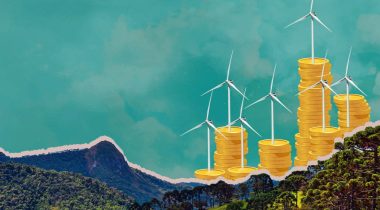
John Christensen ■ Financing Climate Justice

As the climate crisis comes into ever sharper focus the question of how we pay for a just transition takes on ever greater urgency. In this, the first of a two-part special edition of Tax Justice Focus, guest edited by TJN Senior Adviser James Henry, we have brought together key policy proposals to make what is now urgently necessary possible.

This two-part collection of essays is the first in a series of TJN initiatives to bring the global struggles for tax justice, financial transparency, and climate justice closer together, explore common problems and solutions, and help each other to succeed.
Many people think that economic justice is a nice add-on to the climate fight. It isn’t. Without economic justice the fight to tackle the climate crisis will fail. That is because if the great burden of this transition is placed on the shoulders of middle-income and lower-income groups (and especially if the risks of an economically unjust transition materialise, as our second edition will show,) then majorities will not only start to oppose the changes — as the Gilets Jaunes protests in France have shown us — but they will also become prey to fake news and demagogues who seek to overturn the climate justice movement. Tax justice, economic justice, and climate justice must be joined at the hip.
This edition contains five essays, to be followed by four in the next edition.
In the first essay in this edition Laura Merrill, a renowned expert on fossil fuel subsidies lays out the sheer scale of ongoing public sector support for fossil fuels, but also sets out how governments are successfully moving away from this and freeing up some funds to combat climate change — while also improving people’s lives in other ways.
The next article, by Rod Campbell of the Australia Institute, unpicks the bankruptcy of the fossil fuel lobby’s rhetoric in a country that has only recently experienced terrible bushfires.
Next, U.S. economist Professor James K. Boyce, argues in the following article that governments must urgently deploy a powerful and ingenious mechanism to restrict carbon use drastically — and in a politically popular, and just way. The answer is to auction a restricted set of carbon permits – more restricted each year – and redistribute the proceeds equally to all citizens as a universal dividend. Those who use less carbon — which means, predominantly, those in lower-income groups — will receive a net income from the scheme. Eventually the scheme will wither away, as the economy converts rapidly to green energy production, storage, transmission and use.
Then Gail Bradbrook, a founder of the Extinction Rebellion, reflects on the movement’s (enormous) successes and (lesser) failures, and points to how activism will proceed. (Naomi Fowler’s longer version of the Bradbrook interview will be aired in our March 2020 Taxcast.)
Finally, Richard Murphy sets out new accounting proposals to shift the risks being created by large corporations to where they belong – onto balance sheets, so that investors can take a clear and reasoned view of the long-term profitability of companies whose activities harm the climate, and whose business models will now happily come under extreme pressure.
Getting these solutions adopted in a timeframe equal to the urgency of the climate crisis will require us to figure out how to tackle and defeat the shared enemies of both the environmental and tax justice movements: the world’s largest, most influential public and private fossil fuels producers, public utilities, oil and LNG shipping companies, pipeline companies, and agri-businesses — as well as, as the next edition will show the myriad of giant banks, pension funds, hedge funds, other corporate investors, law firms, and accounting firms that stand behind them: tackling the climate emergency will require tackling what academics call financialisation, and what we at TJN call the Finance Curse.
Download and read the full edition of this round of essays here.
The next edition, due on March 26th, will feature articles by
- Peter Bofinger, until recently a member of Germany’s official Council of Economic Advisers, opens that edition with a powerful piece laying out clearly why it has to be the state, especially through judicious borrowing, that leads the climate fight. Unfortunately, old ideologies and Germany’s “Black Zero” obsession with austerity and with curbing borrowing puts the entire climate agenda at risk.
- Daniela Gabor will complement Bofinger’s article, pointing to the exceptional dangers posed by a Wall Street Climate Consensus, now embraced by the World Bank, various central banks, and many others. The alluring argument is that the financial sector can provide the funds to finance the enormous transition: the reality is that while finance can play a role, a finance-led model will eventually create enormous losses to broad populations and to the climate fight – while delivering vast wealth to the financial sector. (As Bank of England Governor Mark Carney said, “This could turn an existential risk into the greatest commercial opportunity of all time.”)
- Jacqueline Cottrell, a member of the Global Conference on Environmental Taxation, writes about the importance of embedding carbon taxes in a broader justice agenda.
- Andres Carvallo, the CEO of a global energy consulting firm, explains how smart grids can break the power of large monopolising utilities and create more just and green forms of energy distribution.
And finally, to coincide with the launch of this new TJN series, John Christensen gave a public talk to a Global Justice Now meeting in Reading on 11th March. A copy of the powerpoint presentation John used for this talk is available here.
Related articles

The tax justice stories that defined 2025

2025: The year tax justice became part of the world’s problem-solving infrastructure

Two negotiations, one crisis: COP30 and the UN tax convention must finally speak to each other

Taxation as Climate Reparations: Who Should Pay for the Crisis?

Why Climate Justice Needs Tax Sovereignty

Why are we gathering in Brazil to talk climate? Why now?

Reclaiming tax sovereignty to transform global climate finance
Reclaiming tax sovereignty to transform global climate finance
16 June 2025
Just Transition and Human Rights: Response to the call for input by the Office of the UN High Commissioner for Human Rights
13 January 2025


